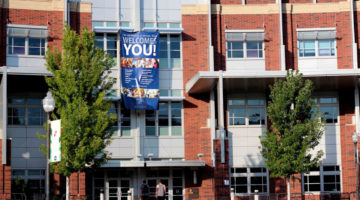By Jacob Solis
Editor’s Note: THE WHOLE STORY will be an occasional feature where The Nevada Sagebrush takes a comprehensive look at a story, be it local, national or otherwise, that developed quickly — often too quickly — causing some details to remain hazy to those of us not glued to the newswires. All the facts, from what we know to how we know it to what we don’t know, will be in one place.
On Friday night, eight terrorists from the so-called Islamic State, more often called ISIS, launched an assault on civilians across Paris, France. Suicide bombs exploded outside the country’s largest stadium, the Stade de France, where French president François Hollande was watching the French national soccer team take on Germany.
Within minutes, hundreds were mowed down or taken hostage inside a concert hall while bombs and gunfire erupted at three other locations.
For the better part of the night, the city was under siege. By the end of the day, over 100 Parisians were dead and more than 300 were wounded. Across the world, people joined France in mourning the victims of the deadliest terrorist attack on European soil since attacks on Spanish trains in 2004 that left nearly 200 dead and almost 2,000 wounded.
But how did it happen and why? Here are the facts so far:
What we know
The attack began with three explosions outside the Stade de France at around 9:20 local time. Broken into three teams, the attackers then launched assaults on several restaurants and cafes not too far away from the stadium, as well taking hundreds of concertgoers hostage in the Bataclan concert hall.
By night’s end, 129 people were dead, mostly from the attack on the Bataclan. Roughly 350 were wounded, 99 of whom were in critical condition as of Sunday.
There were eight terrorists in total. Seven were dead by the end of the night, though most of those deaths were caused by suicide bombs. The eighth attacker, identified as Salah Abdeslam, remains on the run, according to The Associated Press. One of the attackers who died, Ahmad al-Mohammed, was found with a passport that logged his entry into Europe through the Greek island of Leros.
Four of the identified terrorists were French nationals, while two were Belgian. Belgian police have arrested seven in connection with the attacks while French authorities and intelligence officials have pegged the Belgian Abdelhamid Abaaoud as the probable mastermind of the attack. An AP profile of the attackers notes his whereabouts are unknown, though he is likely somewhere in Syria.
Days after the attacks, Paris remains a city on edge. A vigil for victims of one of the restaurant shootings was interrupted by panic after firecrackers were thrown into the candles and flowers. Even so, many Parisians in interviews with multiple news outlets have vowed to continue their daily routines unchanged.
Hollande declared a state of emergency and called for three days of national mourning. Moments of silence have peppered life over that same span of time. Even in the U.S., people rallied around France with moments of silence and French flags at professional football games and solidarity on social media. French flag Facebook profile pictures have become the norm and #peaceforparis and #prayforparis filled Twitter.
ISIS claimed responsibility for the attacks shortly after they happened, saying that France’s campaign against them, and by extension Islam, prompted the attack. The Paris attacks come after ISIS claimed responsibility for the downing of a Russian passenger plane over the Sinai peninsula and a deadly attack in the heart of Beirut, Lebanon.
What we don’t know
While the military reaction from the French was swift, the future of the European political landscape remains uncertain. As refugees and migrants continue to pour into the continent from war-torn Syria, Iraq, Afghanistan and the politically unstable Somalia, Europe has begun to shift away from open-border and quota policies that became widespread toward the end of the summer.
Because one of the bombers looks to have entered Europe from Syria via Greece, many in Europe’s emerging far-right have begun to push even harder for tighter immigration laws. Even in France, the controversial Marine Le Pen, leader of the far-right National Front party, called for an immediate halt to France’s intake of migrants, according to Agence France-Presse.
On the international stage, signs are pointing to increased intervention in Syria on the part of Western actors. Hollande was quick to call the attacks “an act of war,” and on Monday promised to “intensify [French] military operations in Syria” before a joint meeting of Parliament. Hollande’s statements come just a day after heavy French bombardment of the ISIS stronghold of Raqqa, Syria.
In the U.S., President Barack Obama has denounced the attack, calling ISIS “the face of evil” during a news conference in Turkey, where Obama is attending the G20 summit. He called for an intensification of the current plan of attack in Syria, which has mostly involved airstrikes from an international coalition. Even so, Obama has been forced on the defensive over his noncommittal stance in Syria, and on Friday said that most of what his detractors are calling for are already being done, according to NPR.
Facebook commenters and op-eds alike have called for swift military responses, galvanized by the perceived audacity of ISIS to attack the West. All the same, only time will tell if the US and other Western nations follow France’s lead into an active role in tackling ISIS.
Jacob Solis can be reached at jsolis@sagebrush.unr.edu and on Twitter @TheSagebrush.











